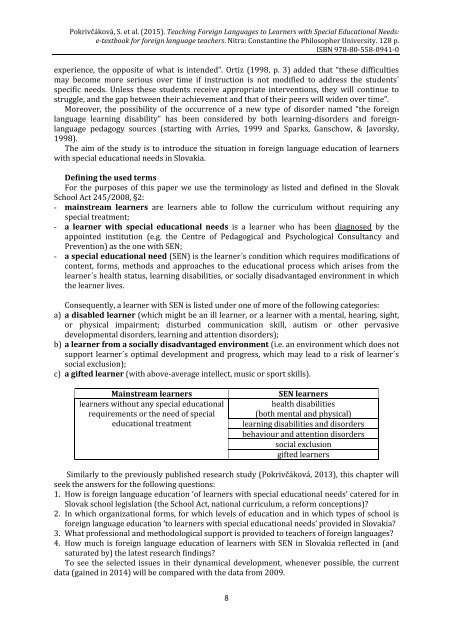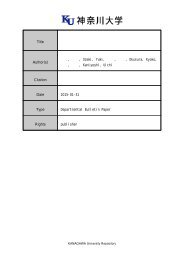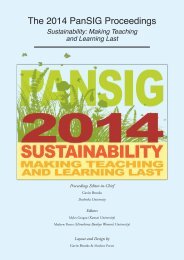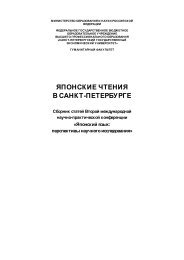to Learners with Special Educational Needs
e-textbook SEN
e-textbook SEN
Create successful ePaper yourself
Turn your PDF publications into a flip-book with our unique Google optimized e-Paper software.
Pokrivčáková, S. et al. (2015). Teaching Foreign Languages <strong>to</strong> <strong>Learners</strong> <strong>with</strong> <strong>Special</strong> <strong>Educational</strong> <strong>Needs</strong>:<br />
e-textbook for foreign language teachers. Nitra: Constantine the Philosopher University. 128 p.<br />
ISBN 978-80-558-0941-0<br />
experience, the opposite of what is intended”. Ortiz (1998, p. 3) added that “these difficulties<br />
may become more serious over time if instruction is not modified <strong>to</strong> address the students´<br />
specific needs. Unless these students receive appropriate interventions, they will continue <strong>to</strong><br />
struggle, and the gap between their achievement and that of their peers will widen over time”.<br />
Moreover, the possibility of the occurrence of a new type of disorder named “the foreign<br />
language learning disability” has been considered by both learning-disorders and foreignlanguage<br />
pedagogy sources (starting <strong>with</strong> Arries, 1999 and Sparks, Ganschow, & Javorsky,<br />
1998).<br />
The aim of the study is <strong>to</strong> introduce the situation in foreign language education of learners<br />
<strong>with</strong> special educational needs in Slovakia.<br />
Defining the used terms<br />
For the purposes of this paper we use the terminology as listed and defined in the Slovak<br />
School Act 245/2008, §2:<br />
- mainstream learners are learners able <strong>to</strong> follow the curriculum <strong>with</strong>out requiring any<br />
special treatment;<br />
- a learner <strong>with</strong> special educational needs is a learner who has been diagnosed by the<br />
appointed institution (e.g. the Centre of Pedagogical and Psychological Consultancy and<br />
Prevention) as the one <strong>with</strong> SEN;<br />
- a special educational need (SEN) is the learner´s condition which requires modifications of<br />
content, forms, methods and approaches <strong>to</strong> the educational process which arises from the<br />
learner´s health status, learning disabilities, or socially disadvantaged environment in which<br />
the learner lives.<br />
Consequently, a learner <strong>with</strong> SEN is listed under one of more of the following categories:<br />
a) a disabled learner (which might be an ill learner, or a learner <strong>with</strong> a mental, hearing, sight,<br />
or physical impairment; disturbed communication skill, autism or other pervasive<br />
developmental disorders, learning and attention disorders);<br />
b) a learner from a socially disadvantaged environment (i.e. an environment which does not<br />
support learner´s optimal development and progress, which may lead <strong>to</strong> a risk of learner´s<br />
social exclusion);<br />
c) a gifted learner (<strong>with</strong> above-average intellect, music or sport skills).<br />
Mainstream learners<br />
learners <strong>with</strong>out any special educational<br />
requirements or the need of special<br />
educational treatment<br />
SEN learners<br />
health disabilities<br />
(both mental and physical)<br />
learning disabilities and disorders<br />
behaviour and attention disorders<br />
social exclusion<br />
gifted learners<br />
Similarly <strong>to</strong> the previously published research study (Pokrivčáková, 2013), this chapter will<br />
seek the answers for the following questions:<br />
1. How is foreign language education ‘of learners <strong>with</strong> special educational needs’ catered for in<br />
Slovak school legislation (the School Act, national curriculum, a reform conceptions)?<br />
2. In which organizational forms, for which levels of education and in which types of school is<br />
foreign language education ‘<strong>to</strong> learners <strong>with</strong> special educational needs’ provided in Slovakia?<br />
3. What professional and methodological support is provided <strong>to</strong> teachers of foreign languages?<br />
4. How much is foreign language education of learners <strong>with</strong> SEN in Slovakia reflected in (and<br />
saturated by) the latest research findings?<br />
To see the selected issues in their dynamical development, whenever possible, the current<br />
data (gained in 2014) will be compared <strong>with</strong> the data from 2009.<br />
8






